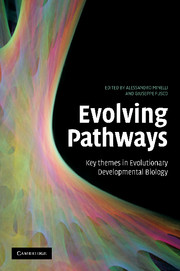Book contents
- Frontmatter
- Contents
- Contributors
- Preface
- Introduction: Pathways of change
- Part I Thinking about evolution by taking development on board
- Part II Evo-devo: methods and materials
- Part III Evolving diversity
- Part IV Evolving body features
- 17 Urbisexuality: the evolution of bilaterian germ cell specification and reproductive systems
- 18 Thoughts and speculations on the ancestral arthropod segmentation pathway
- 19 Evolution of neurogenesis in arthropods
- 20 Arthropod appendages: a prime example for the evolution of morphological diversity and innovation
- 21 Ontogeny of the spiralian brain
- Index
- References
19 - Evolution of neurogenesis in arthropods
Published online by Cambridge University Press: 08 August 2009
- Frontmatter
- Contents
- Contributors
- Preface
- Introduction: Pathways of change
- Part I Thinking about evolution by taking development on board
- Part II Evo-devo: methods and materials
- Part III Evolving diversity
- Part IV Evolving body features
- 17 Urbisexuality: the evolution of bilaterian germ cell specification and reproductive systems
- 18 Thoughts and speculations on the ancestral arthropod segmentation pathway
- 19 Evolution of neurogenesis in arthropods
- 20 Arthropod appendages: a prime example for the evolution of morphological diversity and innovation
- 21 Ontogeny of the spiralian brain
- Index
- References
Summary
Several alternative hypotheses have been suggested that support various phylogenetic groupings of the individual euarthropod taxa, the chelicerates, myriapods, crustaceans and insects. The Tetraconata hypothesis suggests a sister-group relationship of insects and crustaceans in contrast to the traditional monophyletic grouping of myriapods and insects, the Tracheata or Atelocerata (see references in Stollewerk and Chipman 2006). The Mandibulata hypothesis suggests a clade consisting of insects, crustaceans and myriapods (see references in Harzsch et al. 2005). However, the relationships within this clade are being debated since this hypothesis excludes neither the Pancrustacea nor the Tracheata concept. The latest hypothesis suggests a sister-group relationship of chelicerates and myriapods. Although this theory was initially based on molecular phylogenetic analysis (Friedrich and Tautz 1995, Hwang et al. 2001, Kusche and Burmester 2001, Nardi et al. 2003, Mallatt et al. 2004, Pisani et al. 2004), recent morphological and molecular data on neurogenesis in these groups potentially support a close relationship (Stollewerk et al. 2001, 2003, Dove and Stollewerk 2003, Kadner and Stollewerk 2004, Stollewerk and Simpson 2005, Chipman and Stollewerk 2006, Stollewerk and Chipman 2006). On top of the various ideas on the relationships within the euarthropods, none of the groups except the insects is generally accepted as monophyletic.
New insights into the evolutionary relationships between the different taxa have been gained by comparing morphological features and expression patterns of genes involved in developmental processes.
Information
- Type
- Chapter
- Information
- Evolving PathwaysKey Themes in Evolutionary Developmental Biology, pp. 359 - 380Publisher: Cambridge University PressPrint publication year: 2008
References
Accessibility standard: Unknown
Why this information is here
This section outlines the accessibility features of this content - including support for screen readers, full keyboard navigation and high-contrast display options. This may not be relevant for you.Accessibility Information
- 7
- Cited by
